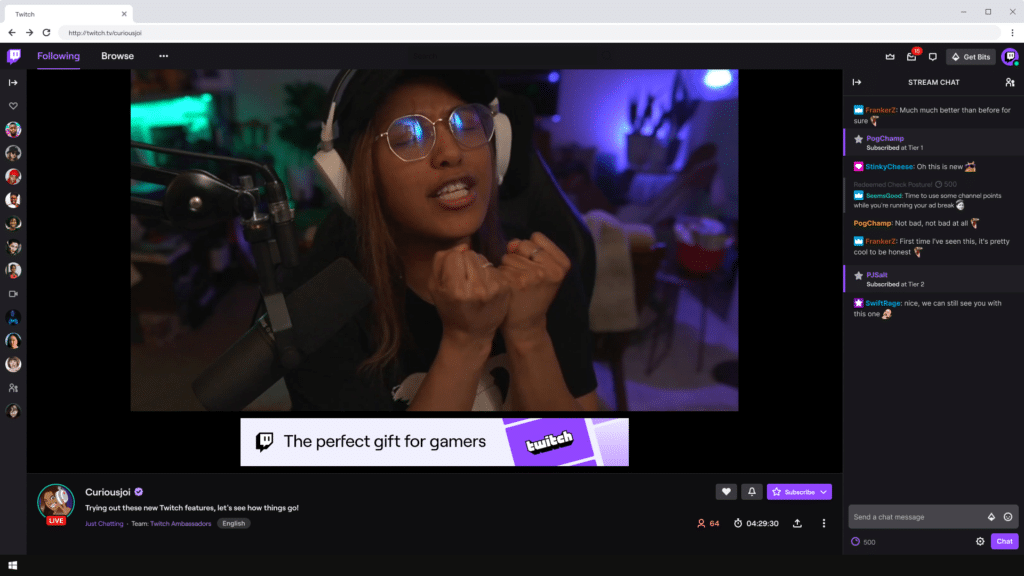Virtual events are live experiences that have become a growing trend in recent years.
Key factors to running a successful virtual event are a good streaming tool, quality infrastructure, and public acceptance.
There are several types of virtual events suited to a variety of marketing strategies. From live blogging to webinars, there is always an audience interested in the content presented.
To the extent to which this format has become increasingly common, there are several tips on conducting such an event successfully. Planning, organization, infrastructure, with a good script, would be a good start.
Aside from all these considerations, event organizers need to identify what they intend to achieve when holding a live event. Respecting a market strategy ensures customer engagement and interaction when these live sessions take place.
In this post, we will focus on virtual events and how to run them successfully. The content will address points like:
- What is a virtual event?
- What are the main types of virtual events?
- What are the best platforms to run virtual events?
- How to you run a virtual event?
- What tips can be useful for running a successful virtual event?
Keep reading and check it out!
What is a virtual event?
Virtual events can be defined as any event that could, in theory, happen in person but is instead held in an online environment.
With live streaming technology, it is possible to provide an enriching experience, even remotely. For that, there are streaming platforms that help to make events like these even more interesting.
In recent years, these events have worked wonderfully as one of the features of Digital Marketing strategies. They can achieve various objectives, such as:
- generating interaction;
- teaching;
- entertaining;
- informing;
- training;
- enabling remote business meetings;
- introducing products and services.
The main advantage of virtual events is its versatility. This type of experience works perfectly well for a wide variety of audiences since it is a democratic format.
While streaming allows for sales meetings, it also works for broadcasting an online gaming session. It all depends on how you publicize the experience to the target audience.
Virtual events in marketing strategies
It is possible to use a variety of virtual event marketing strategies.
Marketers must first know when exactly a virtual event is a viable option. In general, it helps to achieve objectives such as:
- generating engagement (live blogging);
- generating valuable content (webinars, workshops and online courses, all great for Content Marketing strategies);
- removing sales objections (Q&A sessions for companies);
- generating interaction (live streaming on social media, Q&A sessions, and live videogame streaming).
What are the main types of virtual events?
For each objective, there is the right event format. Learning each of these events allows us to understand which one best fits the brand’s strategy.
Next, check out the most common virtual events formats, how they work, and when to choose them.
Live blogging
Live blogging is a format for live coverage of a specific event. In this format, the purpose is to either offer comments, provide real-time updates, and generate interactivity.
Usually, live blogging is common for events like this:
- presidential elections;
- major sports events;
- important announcements (political or business-related);
- discussions about important news.
The idea is to offer this coverage in real-time, ensuring public updates and information. It is a great format to generate engagement, and also a high volume of interaction by users.
Live Q&A
Live Q&A sessions are an alternative to FAQ pages on institutional websites. The online, live model, serves the same purpose but also allows for real-time interaction.
This type of virtual events can also be used in several contexts, such as:
- answering questions about products or services;
- answering general questions about the company;
- generating interaction over a technical subject that is of general interest to the public;
- showing how a particular product is made or manufactured.
When considering the many reasons to run a live Q&A session, it is essential to consider one condition: the public’s real interest in participating. Only then is it possible to engage participants and generate interactions.
Webinar
Webinars are virtual events designed for educational purposes. They are most suitable for Content Marketing strategies that provide free information on a given topic.
Companies can also offer webinars to their employees, such as those offered by universities to their students.
The premise of such event is that it has a teaching function, primarily. It is more dynamic than a simple video lesson since it offers users’ interactions in addition to the content.
Live Social Media Streaming
Live Social Media Streaming comes mostly in an entertaining format. Sessions can be conducted on more entertaining occasions, such as:
- artists chatting with fans;
- small concerts;
- real-time illustration sessions;
- workout sessions;
- Q&A sessions.
This format can be created on platforms like YouTube, Facebook, and Instagram. On social media, they are usually generated by the account owners themselves.
Live Videogame Streaming
Live Videogame Streaming is a huge success!
Professional gamers and streamers are increasingly going to live platforms to play some of today’s most popular games.
The purpose is to interact with fans in real-time and generate engagement. This live format is also used predominantly as a marketing resource.
Videogame developers, accessories, and stores, along with similar businesses in the same market, may invest in marketing campaigns and product production to feature influential or popular figures in the market segment.
In this case, the streamers or gamers who broadcast their sessions will be chosen as brand ambassadors to influencer marketing strategies.
What are the best platforms to run virtual events?
An adequate and well-devised system is required to run a live stream. Nowadays, there are several accessible and easy-to-operate platforms to choose from.
Next, check out which are the best platforms used today, how they work, and the types of events to which they are best suited.
Facebook is one of the best known social media platforms today, and its resources are excellent. Facebook Live is the company’s streaming platform that works for a variety of virtual events.
Just create a page for your business on social media and use the page to stream from. This tool works for important business events and entertainment purposes alike.
Facebook also has a Comments section, which allows you to receive questions and comments. This tool is essential for promoting user interaction.
YouTube
The world’s most popular video platform also allows you to stream virtual events. YouTube has a simplified operation and works very well.
It is usually a choice for longer-lasting events, such as news coverage, sports events, electoral debates, and concert broadcasts.
YouTube, like Facebook, also contains a comment section that allows for user interaction.
In addition, the platform also allows for cash donations, which can be ideal for charitable events or fundraisers, for example.
Twitch
Twitch is the world’s best-known platform for live streaming videogames. Therefore, if the marketing strategy is to address this market, Twitch is an essential tool to work with.
Twitch has specific functions that allow you to add a gamer’s screen to the live stream for the audience’s view.
Twitch can also be very useful for other types of virtual events since the platform is quite complete. It allows for comments, ways to enhance user interaction, and even means to accept donations.
How to run a virtual event?
Running a virtual event is a far more complex job than it looks if you’re looking for cutting-edge results.
You have to plan everything from its infrastructure to each of the topics covered during the event.
Next, check out the step-by-step process on how to run a virtual event.
Create a plan for the event
What subject matter will you be addressing at the event? What is the purpose of the event? What type of virtual event will it be?
These questions will give you a fair understanding of what this experience will be like and how it may best be approached.
From these simple questions, you can develop solid planning skills, which should include some guidelines, such as:
- time duration;
- which platforms it will be streamed on;
- how people will participate;
- possibilities of interaction;
- which topics will be covered;
- who will host the event.
Firstly, any and all details need to be thought of in advance, both technical and strategic aspects. Once this is done, the chances of success on the day of the event will be terrific!
Set up your infrastructure
Setting up the entire infrastructure is essential. To host a virtual event, you must have adequate, quality equipment set up for a high-quality transmission.
Among the main concerns, the focus should be on:
- high-quality, fast internet connection speed;
- appropriate venue to hold the event;
- broadcasting equipment (cameras, microphones, teleprompters, computers, etc.);
- streaming platform.
Choose a streaming platform
The streaming platform is the main tool that makes everything happen. So choose one that fits best with different types of virtual events.
Think about features that you will need to create the perfect experience and check which platforms can provide them.
Before the event, run a private test, limiting access to the session. This should be performed while simultaneously simulating interactions and everything that may happen during the event. Performing this practice test will guarantee that you have made the right choice!
Promote the event
Event promotion is essential for the success of your event. Use your main channels to talk about and inform the audience regarding the date, time, and other related details.
Promotion is an essential step to creating a successful online event. The more effort you exert in promoting the event, the higher your chances that people will attend.
Use social media pages, send email releases, and post descriptions of the event on your website homepage.
Select the channels which receive the most visits from your audience to promote the event. This will ensure that news of the event will reach the largest possible audience.
What tips can be useful in a successful virtual event?
Even after following the step-by-step demonstration, you can better prepare by following some basic tips.
Below, check out some of the most common tips and learn what each has to offer.
Avoid running away from the main topic
Very often, the central topic ceases to be the focus of the event. In such cases, you must be mindful of the script and strictly adhere to it.
Talking about diverging topics and delving deeper into unrelated topics can be frustrating to your audience.
Remember that every event has a specific proposal as its central purpose, and if it is not treated as such, the experience ceases to be interesting.
Make room for interaction
Interaction is essential to the success of any event. Comments, questions, and other actions help make events more exciting and even facilitate your job.
Therefore, set up a space for interaction during the planning stage. Define the point at which questions will be answered, or comments will be read, for example.
Stick to the schedule
The event’s attendance often has a full schedule and needs all the allotted time to carry out all the essential tasks. No matter how well the event is going, respecting the time schedule is crucial.
Proper time management allows you to go through all announced or planned topics in the disclosure phase.
Thus, you prevent the event from dragging on longer than it should.
Have a plan B
Technical issues can happen. Regardless of whether tests have been done, it is essential to be prepared for any unforeseen difficulties that may arise during virtual events.
Always have a replacement or backup equipment, such as microphones, cameras, and computers as a priority.
Check battery levels and make sure everything can be quickly and easily fixed should any problems arise.
Encourage engagement
Encourage engagement from your audience!
Participation is a measure of success and is part of the goals for which virtual events are held.
It’s common for audiences to be shy at times, so you’ll need to encourage them. They will also be more confident if they are stimulated, and their interactions are being met with feedback from other participants.
Virtual events are increasingly common and are excellent for marketing strategies. With a good platform, a consistent script, and stimulating topics, you can attract qualified audiences, generate engagement, and foment valuable interactions!
And to help you organize your event, download now our checklist for webinars, to see all the tasks that should be completed before the broadcast!









